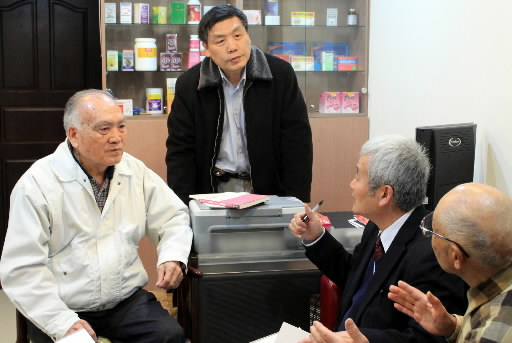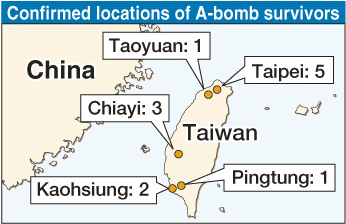Atomic bomb survivors in Taiwan
Jun. 11, 2011
Situation unclear, aid delayed
by Kenji Namba, Senior Staff Writer
Residents of Hiroshima and Nagasaki who support atomic bomb survivors residing overseas are working to locate survivors in Taiwan, which has no diplomatic relations with Japan. Since January the team has interviewed 12 survivors in Taiwan, asking them about their situations at the time of the bombing and their lives now. Based on this survey, last month the group submitted a report to the city and prefectural governments of Hiroshima and Nagasaki asking them to provide the survivors with detailed information on aid and to dispatch medical personnel to Taiwan. It is believed that there are still many atomic bomb survivors in Taiwan, a former colony of Japan. The government’s responsibility is once again being called into question.
Lack of diplomatic relations makes obtaining certificates difficult
Responsibility of Japanese government called into question
The survey is being conducted by Nobuto Hirano, 64, of Nagasaki; Keisaburo Toyonaga, 75, of Hiroshima; and Etsuko Nakatani, 61, of Hatsukaichi, who have provided support to atomic bomb survivors in Korea for many years.
Their efforts were sparked by the results of a survey on atomic bomb survivors conducted by the Ministry of Health, Labor and Welfare, which were posted on the ministry’s website last December. The survey, whose purpose is to gain an understanding of the health and lives of the survivors, is conducted every 10 years. The last survey, which was conducted in 2005, included survivors living overseas for the first time.
Responses were received from 2,499 survivors overseas. Of these, 96.4 percent lived in three countries: South Korea, the United States and Brazil. Replies were received from 14 survivors in Taiwan. Of these six were exposed to the atomic bomb in Hiroshima while the others were exposed in Nagasaki. Mr. Hirano’s team was able to glean some information about victims who had come from Taiwan to study at Nagasaki Medical College, but there was no information about those who were exposed to the atomic bombing in Hiroshima.
Interviews with 12 survivors
So starting in January they made three trips to Taiwan, spending a total of eight days there interviewing survivors in Taipei, Taoyuan, Chiayi, Kaohsiung and other cities. They were able to contact 12 people ranging in age from 67 to 97 and talk to them about their situations at the time of the atomic bombing, their lives afterward and whether or not they have received support from the Japanese government. Of the 12 survivors, seven had been in Hiroshima, and the other five had been in Nagasaki.
The Atomic Bomb Survivor's Certificates of nine of them indicate that they were directly exposed to the bombing, while two show that they were exposed when entering the city after the bombing. One indicates that the survivor was exposed while participating in the rescue effort. Nine of them received their certificates by going directly to the city and prefectural government offices in Hiroshima or Nagasaki. The other three obtained theirs through the Interchange Association, Japan (IAJ), a private foundation affiliated with the Foreign Ministry and other agencies that has offices in Taiwan. Nine of the 12 have received a health care allowance, and one was certified as an A-bomb disease sufferer and has received a special medical allowance. Three have received subsidies for medical care.
With the restoration of diplomatic relations between Japan and China in 1972, diplomatic ties between Japan and Taiwan were severed. Because Japan has no diplomatic mission in Taiwan, the IAJ handles applications for survivor certificates and allowances. Many survivors in Taiwan have received little information on aid and were delayed in receiving their certificates.
Of the seven survivors who were exposed to the atomic bomb in Hiroshima, two were special cadets of the Imperial Japanese Army. Two others had come to Hiroshima to attend junior high school. An 88-year-old man who lives in Taipei was exposed to radiation upon entering Hiroshima to participate in the relief effort. He later joined the medical corps in Nagasaki that was led by Dr. Takashi Nagai. Mr. Hirano’s team believes it is highly likely that the man was exposed to radiation in both cities.
Mr. Hirano said that, perhaps because many of them went to Japan of their own volition, Taiwanese survivors have been less vocal than the Koreans about holding the Japanese government to account. Ms. Nakatani attributed this to the fact that there were doctors, teachers and civil servants among the Taiwanese survivors and many of them are well off. Some, however, complain that the government aid is insufficient and that they struggle to get by.
An 82-year-old man who lives in Chiayi County, came to Japan in 1941 to study at Koryo Private Junior High School (now Koryo High School). His family dealt in general merchandise. At the time there were no good jobs available even for college graduates, and there was a large disparity in wages paid to Taiwanese and Japanese. Hoping to become a doctor, the man came to Japan to study. He was exposed to the atomic bomb while working in a factory as a mobilized student.
After returning to Taiwan he took over the family business and raised a family, but he said that even today he struggles to get by. A former classmate in Hiroshima recommended that the man get certified as an atomic bomb survivor, but he did not know how to apply and gave up. The year before last he read in a newspaper about a man in Taiwan who had received a certificate. He then inquired about how to apply and finally received a certificate.
Lawsuit filed to seek compensation
On May 23, 11 of the 12 atomic bomb survivors in Taiwan and the family of another who has died filed a lawsuit in the Hiroshima District Court seeking compensation from the Japanese government.
In 2007 the Supreme Court ruled that the notice issued by the former Ministry of Health and Welfare stating that atomic bomb survivors who had left Japan were not entitled to receive a health care allowance or other forms of aid was in violation of the law. The government has stated that if there is a finding of fact in a lawsuit, the government will settle with the plaintiffs and provide compensation of 1.1 million to each of them. A settlement is expected to be reached in this lawsuit as well.
Mr. Toyonaga questions the government’s stance by which it stipulates a finding of fact as the result of a lawsuit as a condition for a settlement. “It is not easy to file a lawsuit,” he said. “In the case of Taiwan as well, if this survey hadn’t been conducted, it would have been very difficult. If the government is willing to pay compensation, they should seek the survivors out and apologize to them.”
According to the Ministry of Health, Labor and Welfare, through March of last year certificates had been issued in Hiroshima, Nagasaki and other municipalities to 4,431 overseas atomic bomb survivors residing in 37 countries and regions.
There are many Japanese in the U.S. and Brazil who moved to those countries after being exposed to the atomic bomb. It is believed that there is a significant number of survivors in Taiwan, which, like the Korean Peninsula was colonized by Japan, and that these survivors were exposed to the atomic bomb after moving to Hiroshima or Nagasaki and later returned home.
But, in part because there have been no diplomatic relations between Japan and Taiwan for nearly 40 years, there is very little information about the atomic bomb survivors in Taiwan. In this regard Mr. Hirano said, “Locating the atomic bomb survivors and conducting this survey will allow them to form their own organization in Taiwan, which is important.” He said that the members of the team plan to return to Taiwan in July to continue their survey.
If the survivors have friends or family in Japan, they can be asked to verify that the survivors were exposed to the atomic bomb so that the survivors can then apply for certification. They can also get information about aid for the survivors. In this respect as well, the survivors in Taiwan face a major obstacle.
In light of this, the government must confront the issue of the atomic bomb survivors in Taiwan. It is the responsibility of the government of Japan, which started the war that led to the atomic bombing, to ensure that the Taiwanese who were exposed to the atomic bomb while under Japan’s colonial rule at least receive the same aid as other survivors.
Keywords
Interchange Association, Japan
Diplomatic relations between Japan and Taiwan were severed in 1972 with the issuance of a joint declaration by Japan and China establishing ties between their countries. In the wake of this development, the Interchange Association, Japan, a private foundation sanctioned by the Foreign Ministry, was formed to maintain trade, technical and other working-level exchanges between Japan and Taiwan. The association’s headquarters are located in Tokyo, and it maintains offices in Taipei and Kaohsiung.
(Originally published on June 6, 2011)









